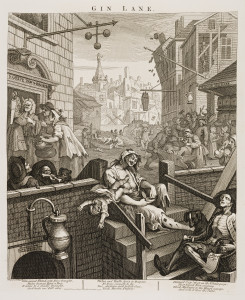The question, whether sin makes one happy, is like the question, whether gin makes one happy. I am thinking here of William Hogarth’s marvelous eighteenth-century engraving, “Gin Lane.” Many of the characters in it are smiling, including the foreground lady on the steps, whose child is in free-fall over the rail, thanks to her inattention.
Yes, one might reply, no one could be bothered to commit sinful acts, if there was not some pleasure in them. Only the fallout makes sin unattractive.
Commercial advertising today, as yesterday, and probably tomorrow, is premised on the notion that various deadly sins are really venial, or perhaps even innocent, and healthy. “You deserve a break today” was, to my mind, the perfect advertising slogan. I cannot even remember what it was selling: probably Gluttony, with a side of Sloth, in a sauce of Pride. Possibly anything.
Were I a latter-day Marshall McLuhan, teaching at the formerly-Catholic St. Michael’s College here in Toronto, I would be flashing popular ads before my students, asking them to spot which deadly sins each is selling. “Mark each one of them, class, out of seven!”
Zero for the small retail ads, that tell one only where a certain class of goods is available: hardware, for instance. Or basic groceries.
Seven for a big splashy luxury-car campaign, which on top of the others, lets you know that owning the automobile in question will drive you through Envy, to satisfy even your Wrath. For, “living well is the best revenge,” and the mere sight of the thing will settle scores with your neighbors.
Cuteness is our contemporary substitute for innocence. Children and animals can be cute. And sugar is sweet, as sentimentality. The trick is not only to stress the bourgeois pleasures of consumption and show, while concealing the associated costs (“death on the installment plan”). It is to make the indulgence seem innocent and sweet.
Hang loose. What could be wrong with taking a break today, from all that sanctified endeavor that oppresses you on the other days?

A like substitution requires the promotion of new sins, as outlets for the guilt that is endemic to human nature. In order to demote the mortal to the venial, we must also promote the venial to the mortal. Being fat, for instance, inverts that “innocent,” rather cute little sin of Gluttony.
This is where, for instance, dieting comes in. If you are fat (from succumbing to all the various commercial suggestions), you should feel badly about it. Not just a little sheepish about having been such a putz: you should feel that you have done something wrong. You must acknowledge your sin, and buy these thinning products, by way of restitution. There will be no absolution until you do.
What works in commerce, works in politics, too, by the same advertising methods. Much has gone wrong, but none of it is your fault; everything can be fixed by buying our product. The sleight here is on the societal level. Think of the benefits, not of the costs. The costs will anyway be assigned to the “rich” who can afford it; so that on top of getting stuff free, you will have the pleasure of sticking it to them. Because, you deserve a break today.
What grieves me now is the sight of my own Church, using the same methods in the hope they will sell her “product” to the masses. And inevitably, adapting the product so that it will sell. We have a “brand” that has fallen in the world’s estimation, but with a few tweaks and an exciting new pitch, it will sell again. Like a new luxury car, or a chocolate bar, Catholicism, too, can make you happy.
From Rome, we are being told – seemingly from around the top – that the failure of the Church to appeal to modern, Western, commercialized man is really just a failure of marketing strategy.
We’ve been emphasizing the costs, we should be emphasizing the benefits. We need a more positive message, a more upbeat tone. We must look more “open” in bright lights and signage. We must remove the obstacles at the cash-points, to make people less reticent to buy.
In particular, we must be willing to extend spiritual “credit.” Let people in a state of mortal sin taste the Sacraments, now; don’t make them wait. Let them pay down “gradually,” with or without interest, but after taking possession. No one could sell cars by demanding cash on the nail, or houses except through mortgages. That is not the way business works.
No: a small penitential down payment, perhaps (to be lifted during the Year-of-Mercy sale) and you can move in right away. Or take the keys to the kingdom and drive off – today.
Among “traditional” Catholics (from tradere, “to hand down”) the objections are not only doctrinal, but intuitive. One feels as if one were selling used cars, that won’t move until we get sharper salesmen. Even before finding chapter and verse, in Bible and Catechism, we sense that what we are doing is sleazy, and all wrong.
Thinking on this, it struck me that my love for Jesus Christ has many aspects. One in particular comes to mind. He was vir dolorum, “a man of sorrows.” The iconology, especially from northern Europe in the Middle Ages, focuses on the wounds of the Crucifixion; yet in my more “Mediterranean” mind, Gethsemane is the focus.
Our Lord was saddened by the spectacle of our world. His vision of our sin in all past and future ages weighed upon him. And yet in that very garden – Gethsemane, where once was Eden – He planted the greater, salvific joy.
So was planted our own joy, and hope in final triumph: in this garden of sorrows, this vale of tears. Our joy is nourished, not in the happy gas of a feel-good sales campaign, but in that tearful soil; in our sadness.














